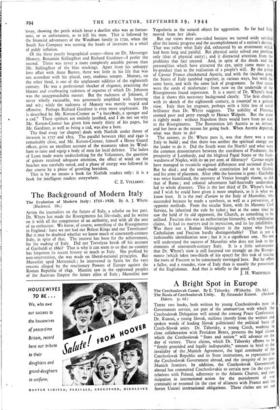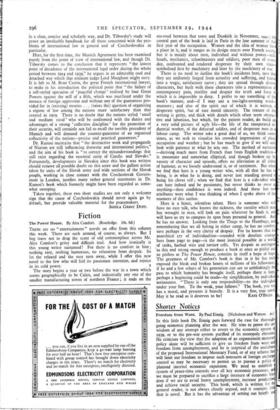A Bright Spot in Europe THESE two books, both written
by young Czechoslovaks now in Government service, are part of the ammuni'ion with which the Czechoslovak Delegation will attend the coming Peace Conference. Dr. Kunosi, a young Slovak, outlines (mostly from the written and spoken words of leading Slovak politicians) the political basis of Czech-Slovak unity. Dr. Taborsky, a young Czech, working in close collaboration with President Benes, presents the legal claims which the Czechoslovak " State and nation " will advance on the day of victory. These claims, which Dr. Taborsky affirms to be " firmly grounded and legally indisputable," amount in brief to the invalidity of the ,Munich Agreement, the legal continuity of the Czechoslovak Republic and its State institutions, as represented in the Czechoslovak Government abroad, and the integrity of its pre- Munich frontiers. In addition, the Czechoslovak Government abroad has committed Czechoslovakia to certain new (in the case of relations with Poland, adherence to the Atlantic Charter, and par- ticipation in international action for the punishment of war criminals) or resumed (in the case of alliances with France and the Soviet Union) international obligations. These claihis are set out
in a clear, concise and scholarly way, and Dr. Taborsky's study will prove an invaluable handbook for all those concerned with the pro- blems of international law in general and of Czechoslovakia in particular.
Here, for the first time, the Munich Agreement has been examined purely from the point of view of international law, and though Dr. Taborsky comes to the conclusion that it represents " the lowest point of decadence of the international legal order during the whole period between x914 and 1939," he argues in an admirably cool and detached way which that eminent judge Lord Maugham might envy. It is left to M. Rene Cassin, the great French international lawyer, to make in his introduction the political point that " the failure of a self-styled operation of `peaceful change' realised by four Great Powers against the will of a fifth, which was mutilated under the menace of foreign aggression and without any of the guarantees pro- vided for in (existing) treaties . . . (raises the) question of organising a regime of law among the nations more satisfactory than that created in 1919. There is no doubt that the nations styled ' small and medium sized' who will be confronted with the duties and advantages of a strong `collective discipline' for the protection of their security, will certainly not fail to recall the terrible precedent of Munich and will demand the counter-guarantee of an organised collectivity of the nations—precise and practical guarantees."
Dr. Kunosi maintains that " the destructive work and propaganda of Nazism arc still influencing domestic and international politics," and the aim of his book is " to correct the misunderstandings that still exist regarding the essential unity of Czechs and Slovaks." Fortunately, developments in Slovakia since this book was written should remove all possible doubt on this score and the gallant action taken by units of the Slovak army and wide sections of the Slovak people, working in close contact with the Czechoslovak Govern- ment in London, justifies many rather general statements in Dr. Kunosi's book which formerly might have been regarded as some- what sweeping.
Taken together, these two short studies are not only a welcome sign that the cause of Czechoslovakia should never again go by default, but provide valuable material for the peacemakers.
SHIELA GRANT DUFF.



























 Previous page
Previous page